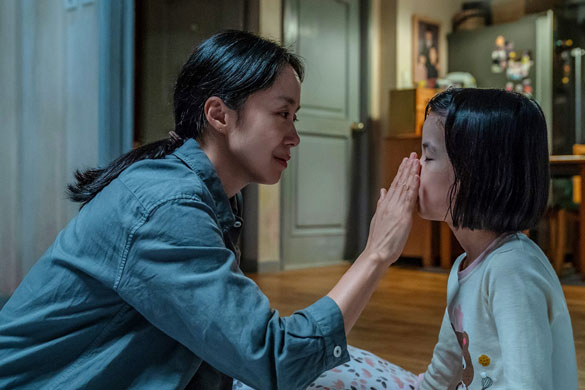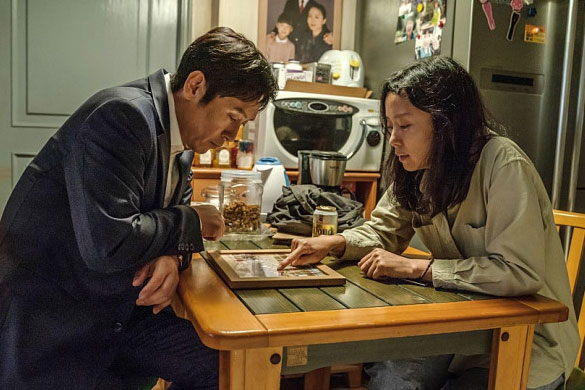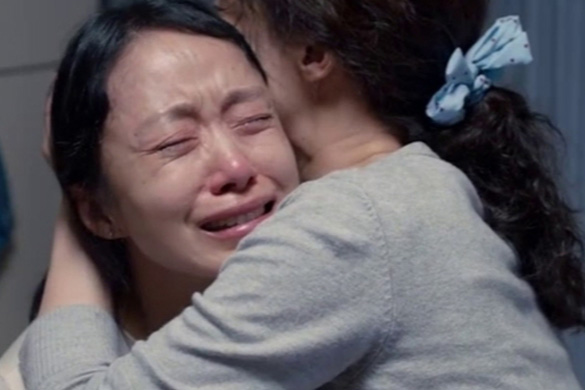
 |
|||
Jung-il (Sol Kyung-gu) returns to Korea after a prolonged period working abroad to not only find his wife, Soon-nam (Jeon Do-yeon), avoiding him and virtually refusing to see or indeed talk to him but also discover she has had divorce papers drawn up which she’s ready to file. Unwelcome in his own home, he instead stays with his sister nearby, enlisting her help to try to reconnect with his young daughter, Ye-sol (Kim Bo-min), much to Soon-nam's largely unspoken exasperation.
Review: Melodrama has long been a mainstay of Korean cinema since the years and decades when extreme censorship came down hard on any narrative critiquing politics, criticising the Korean Government, featuring overt sexuality, depicting alternative lifestyles deemed as inherently immoral, and the like – specific taboo subject matters being at least partly dependent on the regime in power at any particular time. The feeling that melodrama by its very nature was one of the few genres relatively safe from censor scissors or outright banning (or at least as safe as any genre could be) pervaded and entered the Korean cinema zeitgeist, if you will, to the extent it still holds true in today’s more liberal times, certainly for fans of classic Korean films at the very least. As such, the fact that Birthday is unashamed in ultimately showing itself to a melodrama of the highest order (and in this case that is a strength) while detailing a story based around a true life tragedy that garnered severe criticism of political and governmental action, or inaction, and brought protests beyond what would normally be deemed public outcry may on the surface seem to be somewhat of a dichotomy. However, while there are passing references to the ferry disaster of a political or societal bent (different attitudes to and arguments over victim compensation; soap box calls for petition signatures aimed at forcing the Government to make greater efforts to find victim bodies still missing and raise the ferry from the murky depths) these are elements of the story only rather than being at its core.
Su-ho's death has turned his parents’ physical separation into a gaping emotional rift and Soon-nam especially has internalised her grief taking it to her very core, choosing to suffer alone and in keeping Jung-il beyond arms length pushing him to do the same. Humans by their very nature can lapse all too easily into selfishness, thoughtless and even seemingly uncaring action when in a solitary bubble of problems and/or grief and Birthday gives repeated implications of just that for both Soon-nam and Jung-il. That is an ultimate mission statement as worthy as any, Su-ho’s life from the perspective of those he touched standing as a fitting tribute to each and every one of the tragic victims of the Sewol ferry disaster.
The specifics of the disaster are touched on only briefly (mainly through dialogue from a young woman who survived). As far as I’m concerned, that is a wise move on the part of director Lee Jung-un firstly because emotion is far more important to Birthday than facts and figures and sidestepping them ensures there’s nothing to interrupt the narrative flow and secondly there has been so much coverage of the event itself across a plethora of media platforms that there’s not a single Korean, I reckon, who isn’t wholly familiar with the intricacies of the tragedy, so in a personal and human based story further overview detailing simply isn’t necessary. For international viewers, even vague knowledge of the ferry disaster is enough to get everything the director intended from the film and even those with no knowledge of Sewol whatsoever will get sufficient information from the narrative to do the same. Birthday’s pace is meticulously measured, building gently to allow every narrative nuance adequate time to really count in terms of audience immersion. Add to that the fact that layers of Soon-nam’s psyche are gradually unveiled going deeper into the mindset of a female in excruciating emotional pain and I for one was reminded of the work of director Lee Chang-dong on more than one occasion, both generally and specifically (one scene in particular almost cannot fail to bring Lee Chang-dong’s Secret Sunshine to the minds of Korean film fans). Lee Chang-dong was in fact Birthday’s producer so I assume he too felt an empathy to the narrative and Lee Jong-un's directorial style (she previously worked in the directing department on Lee Chang-dong’s Poetry). Considering the fact that Birthday is Lee Jong-un's debut feature, all of the above really can be taken as quite an accolade and certainly raises my anticipation for her ongoing career and excitement for her next project.
BIRTHDAY (생일) / 2019
|
|||
All images © Next Entertainment World Review © Paul Quinn |
|||


